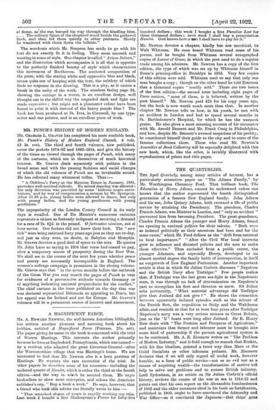Mr. Perish?. History of Modern England (Cassell. 4 vols. £3
3s. net). The third and fourth volumes, now published, cover the periods 1874-92 and 1892-1914, and give the history of the times as viewed through the pages of Panels, with many of the cartoons, which are in themselves of much historical interest. Mr. Graves deals separately with politics in the broad sense and with the passing fashions and social changes
of which the old volumes of Punch are an invaluable record. He has collected many whimsical trifles. Thus:— "A Children's Party at the Mansion House in January, 1881, provokes well-merited ridicule. No mixed dancing was allowed : the only diversion was provided by some ' hideous negro enter- tainers,' and by way of compensation a sermon by Mr. Spurgeon. After 11.30 p.m. young ladies were allowed to dance, but only with younf ladies, and the young gentlemen with young. gentlemen.'
The unpopularity of the London County Council in its early days is recalled. One of Du Manner's numerous cartoons represents a citizen as furiously indignant at receiving a demand for a rate of 2s. Std. in the pound. 0 fortunatos nimium, sea ai bone 'tonne Our fathers did not know their luck. The " new rich" were being satirized forty years ago just as they are to-day, and just as they were, no doubt, in Babylon and Memphis. Mr. Graves devotes a good deal of space to the arts. Ho quotes Mr. John Lane as saying in 1904 that verse had ceased to pay, after a temporary season of prosperity during the Boer War. We shall see in the course of the next few years whether peace and poetry- are necessarily incompatible in England. The women's suffrage campaign is prominent in the closing volume. Mr. Graves says that " in the seven months before the outbreak of the Great War you may search the pages of Punch in vain for evidences of a provocative attitude towards Germany or of anything indicating national preparedness for the conflict." The chief cartoon in the issue published on the day that war was declared represented Britannia as appealing to Peace, but her appeal was for Ireland and not for Europe. Mr. Graves's volumes will be a permanent source of interest and amusement.


































 Previous page
Previous page